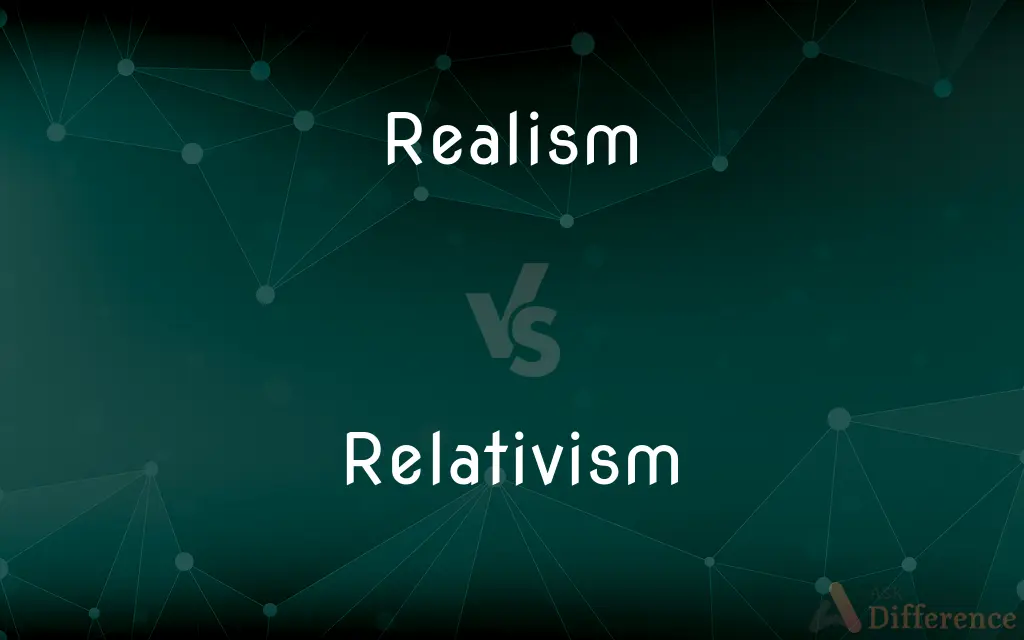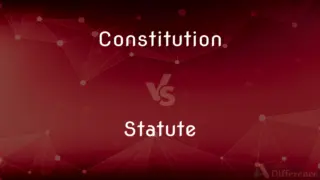Realism vs. Relativism — What's the Difference?
By Tayyaba Rehman & Maham Liaqat — Updated on April 30, 2024
Realism asserts objective reality independent of human perception, while relativism suggests that truth varies based on perspectives or contexts.

Difference Between Realism and Relativism
Table of Contents
ADVERTISEMENT
Key Differences
Realism is a philosophical doctrine emphasizing that reality exists independently of observers, maintaining that truths are universal and discoverable. Whereas, relativism posits that knowledge and truth are not absolute but instead vary according to different perspectives, cultures, or individual beliefs.
In realism, scientific and mathematical truths are seen as discoverable through observation and reason, suggesting a stable, external world that can be understood objectively. On the other hand, relativism challenges the notion of objectivity, arguing that all viewpoints are equally valid, shaped by specific cultural, historical, or personal contexts.
Realism often supports the idea that ethical principles have universal validity. Conversely, moral relativism, a branch of relativism, asserts that ethical truths depend on the specific social, cultural, or individual circumstances, denying the existence of universal moral truths.
In the realm of art and literature, realism strives to depict subjects as they are in real life, focusing on practical and factual representation. Relativism, however, supports the idea that interpretations of art can vary, emphasizing the influence of viewers' backgrounds and contexts on their understanding of art.
Realism encourages teaching based on universal principles and objective knowledge. Whereas, educational relativism promotes understanding that knowledge is context-dependent, encouraging approaches that consider diverse cultural perspectives and individual experiences.
ADVERTISEMENT
Comparison Chart
Philosophical Basis
Reality and truths exist independently of perceptions
Truths and moral standards are context-dependent
Approach to Truth
Objective, universal truths
Truths vary by individual, culture, or historical context
Ethical View
Universal ethical principles
Ethical standards vary by society and context
Application in Art
Seeks to represent life realistically
Emphasizes subjective interpretations and cultural contexts
Educational Philosophy
Focuses on objective knowledge
Emphasizes culturally relative knowledge
Compare with Definitions
Realism
Belief in an objective reality.
Realism in science posits that physical laws are universally true.
Relativism
The idea that truth is not absolute but varies.
Cultural relativism observes that moral codes differ across societies.
Realism
In art. a style that depicts life accurately without embellishment.
His paintings show a realism that captures the stark reality of urban life.
Relativism
In philosophy. asserts that points of view have no absolute truth.
Relativism challenges the idea that any world view can be the only truth.
Realism
In literature. focuses on everyday life and practical situations.
Realist novels often depict the complexities of ordinary existence.
Relativism
In art. suggests interpretation depends on individual perspectives.
Relativist views in art highlight how personal experiences shape one's understanding of a piece.
Realism
In international relations. assumes states act in their rational self-interest.
Realism suggests that diplomatic policies are driven by pragmatic rather than moral considerations.
Relativism
Ethical relativism holds that morality varies between cultures.
What is considered ethical in one culture may be taboo in another.
Realism
Philosophical realism argues that entities exist independently of being perceived.
Mathematical realism holds that numbers exist independently of human thought.
Relativism
Advocates that historical context shapes understanding.
Historical relativism suggests interpretations of events depend on one's cultural and temporal position.
Realism
An inclination toward literal truth and pragmatism.
Relativism
Relativism is a family of philosophical views which deny claims to objectivity within a particular domain and assert that facts in that domain are relative to the perspective of an observer or the context in which they are assessed. There are many different forms of relativism, with a great deal of variation in scope and differing degrees of controversy among them.
Realism
The representation in art or literature of objects, actions, or social conditions as they actually are, without idealization or presentation in abstract form.
Relativism
The theory that value judgments, as of truth, beauty, or morality, have no universal validity but are valid only for the persons or groups holding them.
Realism
The scholastic doctrine, opposed to nominalism, that universals exist independently of their being thought.
Relativism
The theory, especially in ethics or aesthetics, that conceptions of truth and moral values are not absolute but are relative to the persons or groups holding them.
Realism
The modern philosophical doctrine, opposed to idealism, that objects exist independently of their being perceived.
Relativism
A specific such theory, advocated by a particular philosopher or school of thought.
Realism
A concern for fact or reality and rejection of the impractical and visionary.
Relativism
(philosophy) the philosophical doctrine that all criteria of judgment are relative to the individuals and situations involved
Realism
An artistic representation of reality as it is.
Realism
(sciences) The viewpoint that an external reality exists independent of observation.
Realism
(philosophy) A doctrine that universals are real—they exist and are distinct from the particulars that instantiate them.
Realism
As opposed to nominalism, the doctrine that genera and species are real things or entities, existing independently of our conceptions. According to realism the Universal exists ante rem (Plato), or in re (Aristotle).
Realism
Fidelity to nature or to real life; representation without idealization, and making no appeal to the imagination; adherence to the actual fact.
Realism
The practise of assessing facts and the probabilities of the consequences of actions in an objective manner; avoidance of unrealistic or impractical beliefs or efforts. Contrasted to idealism, self-deception, overoptimism, overimaginativeness, or visionariness.
Realism
The attribute of accepting the facts of life and favoring practicality and literal truth
Realism
(philosophy) the philosophical doctrine that physical object continue to exist when not perceived
Realism
The state of being actual or real;
The reality of his situation slowly dawned on him
Realism
An artistic movement in 19th century France; artists and writers strove for detailed realistic and factual description
Realism
(philosophy) the philosophical doctrine that abstract concepts exist independent of their names
Common Curiosities
Can realism and relativism be reconciled in any philosophy?
Some philosophical views attempt to integrate elements of both, recognizing objective realities while acknowledging that our understanding of them can be influenced by cultural or personal perspectives.
How does ethical relativism differ from moral realism?
Ethical relativism suggests moral truths vary by society and context, whereas moral realism believes in fixed, universal moral truths.
What is an example of realism in science?
Realism in science might assert that electrons exist and have specific properties, regardless of whether we observe them.
How is realism applied in international relations?
In international relations, realism posits that states act based on national interest and security, rather than moral ideals.
How do realism and relativism influence educational approaches?
Realism promotes education based on universal truths and objective knowledge, while relativism encourages educational models that adapt to cultural and individual perspectives.
Is relativism more prevalent in modern societies?
Modern societies, with their emphasis on diversity and cultural sensitivity, often show a trend towards relativistic views in social and ethical discussions.
How do realism and relativism view technological advancements?
Realism might view technological advancements as progress based on objective improvements, while relativism could interpret their impacts differently based on social or cultural contexts.
Does relativism lead to tolerance or indecisiveness?
Relativism can promote tolerance by acknowledging the validity of diverse viewpoints, but critics argue it might also lead to indecisiveness or moral ambiguity.
What is the main difference between realism and relativism?
Realism advocates for objective truth independent of human perception, while relativism believes truth varies based on different perspectives or contexts.
What challenges does relativism face in philosophy?
Relativism faces challenges in justifying why any opinion should be preferred over another if all are equally valid.
Can one be a realist in science and a relativist in ethics?
Yes, it's possible to adopt realism in the objective understanding of the natural world while applying relativism to subjective social constructs like morality.
What is a criticism of realism?
A common criticism of realism is its potential to overlook how subjective perceptions shape our understanding of reality.
What role does culture play in relativism?
Culture plays a central role in relativism, as it argues that understanding and truth are deeply influenced by cultural context.
Why might an artist prefer relativism over realism?
An artist might prefer relativism for its allowance of personal expression and the acknowledgment of diverse interpretations by different audiences.
What impact does relativism have on global interactions?
Relativism can affect global interactions by promoting a deeper understanding and respect for different cultural perspectives, potentially leading to more nuanced diplomatic relations.
Share Your Discovery

Previous Comparison
Thermocouple vs. Thermostat
Next Comparison
Constitution vs. StatuteAuthor Spotlight
Written by
Tayyaba RehmanTayyaba Rehman is a distinguished writer, currently serving as a primary contributor to askdifference.com. As a researcher in semantics and etymology, Tayyaba's passion for the complexity of languages and their distinctions has found a perfect home on the platform. Tayyaba delves into the intricacies of language, distinguishing between commonly confused words and phrases, thereby providing clarity for readers worldwide.
Co-written by
Maham Liaqat















































